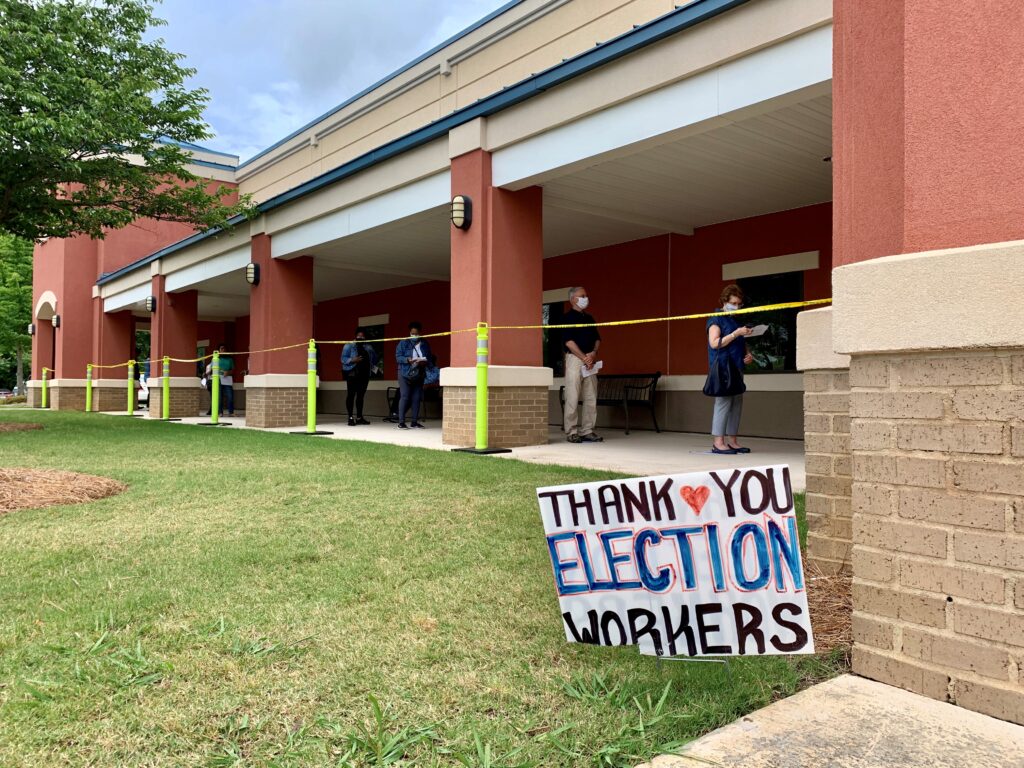
ATLANTA – Last year, Republicans pushing an election reform bill through the General Assembly argued they were restoring public trust in elections following allegations of voter fraud in Georgia in 2020.
Democrats charged the 2021 legislation amounted to voter suppression by Republicans determined to reverse Democratic gains, particularly the capture of the Peach State’s two U.S. Senate seats.
Now, the two sides are fighting the same battle over a follow-up bill the Republican-controlled Georgia House of Representatives passed along party lines earlier this month and sent to the state Senate.
“It’s ‘deja vu all over again,’ ” said Aunna Dennis, executive director of Common Cause Georgia, one of the fair-elections advocacy groups working with Democrats to oppose the measure.
House Bill 1464 has some provisions Common Cause Georgia and others have praised, including a provision requiring employers to give their workers time off to cast their ballots during the early voting period prior to elections. Current law limits the time-off mandate to voting on Election Day.
But legislative Democrats can’t get past what they see is the motivation behind the bill: allegations of widespread voter fraud lodged by then-President Donald Trump following the 2020 election and his attempts to overturn the results in Georgia and elsewhere.
“We’re continuing to enact laws based on the lies that led to the violent insurrection at the U.S. Capitol,” state Rep. David Dreyer, D-Atlanta, said March 15 during the House debate on the legislation.
Republicans have defended the bill as an effort to restore trust in elections by increasing security surrounding the voting process, including tightening up requirements for sealing and transferring custody of ballots.
“In our society, the election process should be the most secure thing we have,” said Sen. Jeff Mullis, R-Chickamauga.
But Democrats say that added security would come at the expense of a centralization of the elections process to the detriment of local elections offices.
“This bill will devastate local election administration,” said Rep. Miriam Paris, D-Macon. “The State Election Board will have the centralized power to decide what all 159 counties in Georgia need.”
The bill’s most contentious provision would give the Georgia Bureau of Investigation (GBI) “original jurisdiction” to investigate election complaints, meaning the agency wouldn’t have to wait to be called into a case by the State Election Board or the attorney general’s office.
“If they get tipped off that something’s going on, they could step right in,” Rep. Stan Gunter, R-Blairsville, chairman of the House Special Committee on Election Integrity, told members of the Senate Ethics Committee March 23.
Democrats argued involving the GBI likely would lead to a flurry of arrests, even in cases where the alleged offender is doing something he or she isn’t aware is a crime, such as collecting absentee ballots from friends or relatives to take to a drop box.
“When you consult a surgeon, you’re probably going to get surgery,” said Sen. Sally Harrell, D-Atlanta. “If you consult the GBI, you’re probably going to get a crime.”
“The GBI conducting voter fraud investigations will be used to intimidate Georgia voters and election workers,” added Rep. Derek Mallow, D-Savannah. “This is another attack on the right to vote.”
But Republicans said voters have nothing to fear from the GBI, which has been investigating election complaints for years when their help is requested.
“This would not be SWAT teams parachuting onto the grounds of the courthouse,” Gunter said. “They’re not going to be standing over voters. … I’m sure they will exercise discretion.”
“If you break the law, there will be due process before you could get arrested,” added Rep. James Burchett, R-Waycross, the bill’s chief sponsor.
The Senate Ethics Committee will hold a second hearing on the bill on Monday and likely vote on it later in the week.
This story is available through a news partnership with Capitol Beat News Service, a project of the Georgia Press Educational Foundation.
